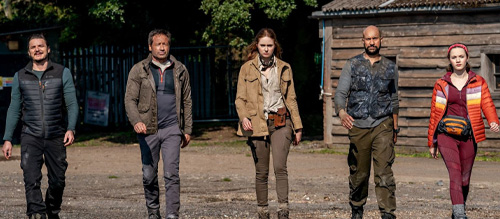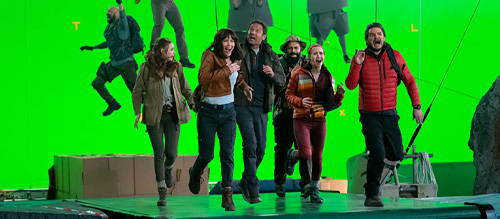The Bubble (2022) Review
The Bubble (2022)
Director: Judd Apatow
Screenwriter: Judd Apatow, Pam Brady
Starring: Karen Gillan, Iris Apatow, Pedro Pascal, Leslie Mann, Fred Armisen, David Duchovny, Keegan-Michael Key, Kate McKinnon, Guz Khan, Peter Serafinowicz, Maria Bamford, Vir Das, Maria Bakalova
Judd Apatow has had a long, sturdy career in film and television comedies. His work, in films like Knocked Up and television shows like Freaks & Geeks, has often exhibited a naturalistic approach to its characters, with his masterful 2009 film Funny People even pointing his honest lens on success and aging within the entertainment industry. In his latest film, Netflix’s The Bubble, he broaches the subject of the entertainment industry again, this time focusing on a group of actors filming the sixth installment of a massive studio franchise – a series of dinosaur-themed action films called Cliff Beasts – in the middle of the COVID-19 pandemic, and all the troubles that ensue within that challenging scenario. In a meta sense, though, there is an inherent issue with depicting the challenges of such a scenario when the challenges themselves are so uniquely unrelatable and unnecessary, especially in the context of a global pandemic. This is a flaw in the fabric of Apatow’s failed film industry satire that he is never quite able to overcome.
The satire in The Bubble feels deeply insecure, in the sense that it is far too obsessed with getting ahead of the audience’s perceptions of this film’s evident flaws instead of embracing a clear-eyed satirical perspective one way or the other. If the intention here is to make an Albert Brooks-style satire on Hollywood vanity — which is the most flattering read on this to have — then what Apatow fails to do is pin down whether we should be laughing at these characters or caring for them. When you can’t do that, especially when your film is centered around a pandemic that has negatively impacted the lives of millions, the best course of action is to adopt Gal Gadot’s tone-deaf “Imagine” video as a point of comparison and practice some self-awareness. As a film about shooting needless entertainment in the middle of a pandemic – which The Bubble is self-admittedly guilty of – any commentary on “mindless” blockbusters and how a “making movies is fun and isn’t that what it’s all about?” mindset is both harmful and wasteful, and is ultimately undone by this film’s own existence.
The only acute sense of self-awareness that The Bubble has to offer comes in the last scene where a few of the characters, referring to Cliff Beasts 6, say that the opening of their film is weak but maybe if the ending is strong it won’t matter as much. But not only is that another case of insecure satire trying to distance itself from its own criticisms towards soulless studio films, it is also barely true about The Bubble itself. This ending sting, in which we see the premiere of a documentary depicting the events that we saw, followed by the aforementioned conversation between characters, is reminiscent of the mid-credits scenes you’ll find in Adam McKay’s latest two films, Vice (2018) and Don’t Look Up (2021). One hopes that Apatow’s career is not heading in a similarly self-important and out-of-touch direction as McKay’s did, though The Bubble’s lazy and pointless ruminations on current events is not promising.
A major discrepancy between The Bubble and Apatow’s past work is the lack of naturalism here. Of course, the film’s meta-textually incorporates its extremely unnatural environment, so it is completely unintentional, but the issue remains even through the film’s attempts to focus on the private and personal moments of its characters, unfortunately. The Bubble also has the typical visual blandness of a Netflix original, with no differentiation between the film and the “disastrous” film within the film, which lends to its lack of naturalism. Worse yet, The Bubble is occupied with broad quips about how movie theaters may never exist again, so its embrace of Netflix’s uniform ugliness is yet another indication that this film has little respect for the art of film-making.

Apatow has assembled a mostly promising ensemble of actors to portray the film’s cast and crew – including Karen Gillan, Pedro Pascal, Keegan Michael-Key, David Duchovny, as well as his mainstay cast/family members, wife Leslie Mann and daughter Iris Apatow – most of whom are portrayed as self-righteous, oblivious and phony. It’s difficult to explain the plot without breaking into several tangential descriptions of the film’s vignette-heavy structure, but it feels that in tandem with its thematic lack of focus, Apatow struggled to let the cast thrive together, instead relying on their existing talents and letting whatever happens happen. What’s odd, though, is that Apatow’s eye for talent is usually a source of his success. On top of essentially cementing the movie-star status of the likes of Seth Rogen, Jonah Hill, and more, his previous two directorial efforts – Trainwreck (2015) and The King of Staten Island (2020) – managed to be extremely charming, airy stories that centered on comedians who are generally controversial, if not outright disliked. Not to mention that his entire oeuvre is full of brilliantly-placed cameos and bit-parts that also function as Hollywood in-jokes (see: Lebron James in Trainwreck; Action Bronson in The King of Staten Island; the onslaught of celebrities playing themselves in Knocked Up and Funny People). All of this exhibits a unique understanding of talent that is missing in The Bubble, which still fills itself with awkward cameos and characters who show minimal understanding of current pop culture.
Karen Gillan’s character is exemplary of the issue with The Bubble’s treatment of its characters at large. Portraying the returning star of the series, who skipped out on starring in the fifth entry only to find no success in other endeavors, she comes into this film full of insecurity and afraid that her co-stars will hate her. Being the ostensible lead, she also faces issues that encompass the intended themes and messages of the film overall, such as having a difficult time feeling connected to the film she is making as different elements are slowly removed and replaced due to budget constraints, studio interference and general on-set chaos. The returning question that lingers around her character, though, is whether the audience is meant to care for her or not. After an extremely dangerous on-set experience that left several cast and crew members injured, Gillan’s character tries to take to Iris Apatow’s character’s massive TikTok following, which Apatow doesn’t allow her to do because “no one wants to hear celebrities complain”. The problem is that this is the worst time in the film that such an argument could be brought up, because not only are unsafe working conditions in Hollywood an extremely real issue, but it’s additionally unclear whether we are meant to agree or not.
The reigning champions of The Bubble are the actors who play the non-celebrity workers on the film set, played by Samson Kayo, Maria Bakalova, Galen Hopper, and Harry Trevaldwyn. These newcomers are where you can feel Apatow’s eye for talent, and quite clearly should have been given greater focus within the film. Had the plot been centered around any one of these actors, grounding the film with folks who are being put in this unsafe position without the same benefits of fame and money, it could have erased many of the film’s uncomfortable issues, as well as injecting a fresh sense of humor into the project. The fact that Apatow literally casts his wife and daughter and yet it doesn’t feel like he can acknowledge his complicity or privilege, nor does it feel like he is interested in at least utilizing their relationship for sympathy, shows that his position as the rich director of this film is the cause for its lack of valuable perspective, which is felt all the way through its bloated 126 minute runtime.
7/24
Written by Nicholas Armstrong
You can support Nicholas Armstrong in the following places:
Tumblr – nickarmstrongfilm
Letterboxd – /nicorice
Twitter – @mfshrimp


